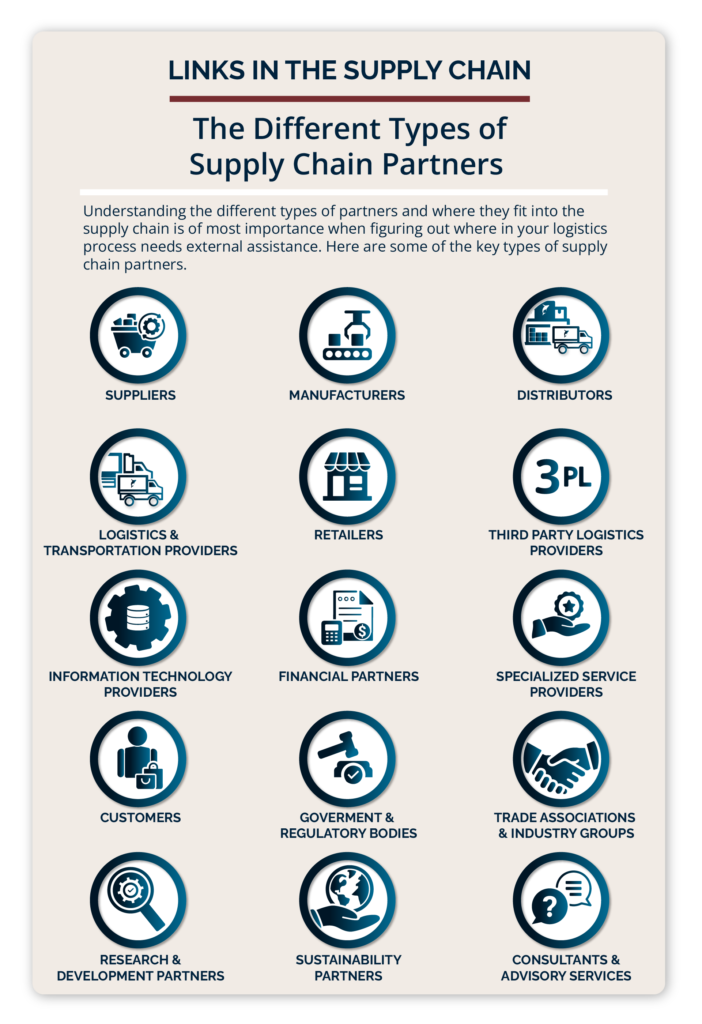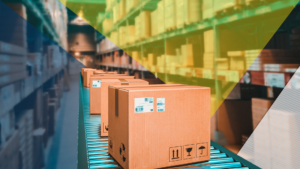In our contemporary era of global markets, rapid technological innovation, and ever-evolving consumer demand, supply chain partners form the complex web of business collaboration that underpins the dynamic process of bringing goods and services to consumers. From the truck that delivers your packages, to the distributors putting their products on shelves at the supermarket; the supply chain is ever flowing, even if you hardly notice it. But the supply chain keeps our economy humming—often only becoming notably conspicuous when supply-chain issues occur (we won’t soon forget the supply woes of Covid-19, when lockdowns, quarantines, and travel restrictions led to factory closures, labor shortages, and transportation bottlenecks).
The interdependence of supply chain companies highlights the critical role that robust partnerships play in creating efficient, agile, and sustainable supply chains that drive business growth and meet the ever-changing needs of today’s interconnected world.
What is the Supply Chain?
The supply chain refers to the interconnected network of organizations, processes, activities, resources, and technologies involved in the creation, production, distribution, and delivery of goods and services from raw material suppliers to end consumers. A supply chain partner is any party involved in facilitating the smooth flow of goods, services, and information from the point of origin to the final consumer—either directly or indirectly (through technology, financing, government regulation, etc.). The entities involved in the supply chain also play a significant role in its overall efficiency and effectiveness.
Supply chain partners may vary depending on the given industry and the structure of its supply chain. They may include suppliers, manufacturers, distributors, retailers, transportation and logistics providers, technology providers, and even customers. Each link in the supply chain contributes a valuable and unique set of capabilities.
An effective supply chain is vital for businesses to remain competitive in our dynamic global market by ensuring products are available, affordable, and of the best quality—while also meeting consumer demands and expectations.
Links in the Supply Chain: The Different Types of Supply Chain Partners
Understanding the different types of partners and where they fit into the supply chain is of most importance when figuring out where in your logistics process needs external assistance. Here are some of the key types of supply chain partners.
Suppliers: Provide the raw materials or components required for manufacturing and production. Without suppliers, a manufacturer wouldn’t be able to reliably produce a steady flow of finished products.
Manufacturers: Transform raw materials and components into finished products. They are responsible for the production process, quality control, and meeting production schedules.
Distributors: Intermediaries that help move products from manufacturers to retailers or end customers. They manage warehousing, transportation, and order fulfillment to ensure timely delivery of goods. A distributor may partner with a 3PL for storage before selling products to a retailer.
Logistics and Transportation Providers: Handle the movement of goods throughout the supply chain, including transportation, shipping, and warehousing. They ensure that products are delivered efficiently and on time.
Retailers: The points of sale where consumers buy products. Retailers manage inventory, pricing, and customer interactions. Retailers can be brick-and-mortar stores, e-commerce platforms, or other sales channels.
Third-Party Logistics (3PL) Providers: Offer specialized logistics services such as transportation, warehousing, order fulfillment, and inventory management. They act as a third party to help optimize supply chain operations for other companies.
Information Technology (IT) Providers: Provide technology solutions, software, and platforms that enable supply chain partners to track inventory, manage orders, share business insights and data, and collaborate effectively.
Financial Partners: Provide financing solutions, credit, and payment processing services that support the financial needs of the supply chain, such as managing cash flow and transactions.
Specialized Service Providers: Contribute to the overall supply chain efficiency through services like packaging, labeling, quality inspections, and maintenance.
Customers: Typically considered the end of the supply chain, they can also be viewed as partners, since their demand and preferences drive the entire supply chain process.
Government and Regulatory Bodies: Establish laws and regulations that impact the supply chain, including customs, import/export regulations, safety standards, and environmental regulations.
Trade Associations and Industry Groups: Facilitate collaboration, knowledge sharing, and best practice development among supply chain partners within a specific industry or sector.
Research and Development Partners: In industries that require innovation, research institutions, universities, and technology companies may collaborate with supply chain partners to develop new products, processes, and technologies.
Sustainability Partners: As sustainability becomes more important, organizations may partner with environmental organizations, NGOs, and other stakeholders to promote responsible sourcing, reduce environmental impact, and ensure ethical practices.
Consultants and Advisory Services: These partners provide expertise and guidance on supply chain optimization, process improvement, risk management, and strategic planning.

How do Supply Chain Partners Help a Business Grow?
Supply chain partners play a significant role in helping a business grow by contributing to various aspects of the business’s operations, efficiency, and overall value proposition. Here’s some of the ways that supply chain partners can contribute to business growth:
Expanded Capacity and Resources: Supply chain partners provide access to additional resources, expertise, and capabilities that may not be available internally. This allows businesses to scale up production, expand into new markets, and introduce new products or services more efficiently.
Operational Efficiency: Collaborating with specialized partners such as logistics providers, manufacturers, and distributors can lead to streamlined operations, reduced lead times, and improved order fulfillment. This, in turn, enhances customer satisfaction and helps the business attract and retain more customers.
Faster Time-to-Market: Supply chain partners can accelerate the time it takes to bring new products to market. They contribute by leveraging their expertise and resources to optimize production processes, shorten development cycles, and manage logistics effectively.
Cost Optimization: Effective collaboration with partners can lead to cost savings through economies of scale, reduced transportation costs, and efficient inventory management. Suppliers and manufacturers can help negotiate favorable terms and pricing, leading to better cost control.
Market Access: Supply chain partners often have established distribution networks and market presence. Partnering with distributors, retailers, or e-commerce platforms can help a business reach a wider audience and tap into new customer segments.
Innovation and Expertise: Collaborating with technology partners, research institutions, or specialized service providers can bring innovation and fresh ideas to the business. These partners can contribute to product development, process improvements, and the adoption of new technologies.
Risk Mitigation: Supply chain partners can help businesses manage and mitigate risks by sharing responsibility for various aspects of the supply chain. Partnerships can provide access to contingency plans, alternative sourcing options, and expertise in dealing with supply chain disruptions.
Focus on Core Competencies: Partnering with specialized supply chain partners allows the business to focus on its core competencies and strategic activities. Outsourcing certain functions to partners allows the business to allocate resources more effectively and concentrate on its strengths.
Scalability and Flexibility: As the business grows, supply chain partners can adapt to changing demand and capacity requirements. They provide the flexibility to scale operations up or down without the need for significant internal investments.
Geographic Expansion: Collaborating with partners in different regions or countries can facilitate geographic expansion by leveraging local expertise and market knowledge.
Improved Customer Experience: A well-orchestrated supply chain ensures that products are available when and where customers need them. This enhances the overall customer experience and contributes to repeat business and positive word-of-mouth referrals.
Market Insights: Supply chain partners often have insights into market trends, consumer preferences, and industry developments. This information can help the business make informed decisions and tailor its offerings to meet changing market demands.
Sustainability and Corporate Social Responsibility: Partnering with supply chain partners that adhere to sustainable and ethical practices can enhance the business’s reputation, attract environmentally conscious customers, and align with corporate social responsibility goals.
What Technology is Used in the Supply Chain?
Technology has emerged as a transformative force within the supply chain. From digitizing traditional processes to revolutionizing how information flows and decisions are made, technology’s impact is profound and far-reaching. By harnessing innovative tools such as artificial intelligence, data analytics, Internet of Things (IoT), and blockchain, supply chain management has been redefined, offering unprecedented levels of visibility, efficiency, and responsiveness.
Supply chain partners leverage technology to help a business grow by enhancing efficiency, visibility, collaboration, and customer satisfaction throughout the supply chain. Here are some of the technologies that supply chain partners use to facilitate business growth:
Supply Chain Management (SCM) Software: SCM software platforms provide end-to-end visibility and control over supply chain operations. They help manage inventory, demand forecasting, order processing, and collaboration among supply chain partners.
Enterprise Resource Planning (ERP) Systems: ERP systems integrate various business functions, including finance, production, inventory, and human resources. They provide a unified platform for data management and decision-making.
Warehouse Management Systems (WMS): WMS software optimizes warehouse operations by managing inventory, order picking, packing, and shipping. It improves warehouse efficiency and accuracy.
Transportation Management Systems (TMS): TMS software optimizes transportation routes, manages carrier relationships, and tracks shipments in real time. It helps reduce transportation costs and improve delivery timelines.
Electronic Data Interchange (EDI): EDI enables the electronic exchange of business documents, such as purchase orders, invoices, and shipping notices, between supply chain partners.
Radio Frequency Identification (RFID): RFID technology uses radio waves to track and identify items with tags. It enhances inventory accuracy, reduces manual tracking efforts, and improves visibility.
Internet of Things (IoT): IoT devices, such as sensors and connected devices, collect real-time data from products, equipment, and vehicles. This data helps monitor conditions, track assets, and optimize operations.
Blockchain Technology: Blockchain provides a secure and transparent way to record and verify transactions across the supply chain. It enhances traceability, reduces fraud, and improves trust among partners.
Artificial Intelligence (AI) and Machine Learning (ML): AI and ML algorithms analyze large datasets to identify patterns, optimize processes, and make predictive decisions. They can enhance demand forecasting, route optimization, and quality control.
Predictive Analytics: Predictive analytics uses historical and real-time data to forecast future trends and outcomes. It helps businesses anticipate demand, manage inventory, and mitigate risks.
Cloud Computing: Cloud platforms provide scalable and flexible infrastructure for data storage, software applications, and collaboration among supply chain partners.
Collaborative Planning, Forecasting, and Replenishment (CPFR): CPFR tools facilitate collaboration between supply chain partners to improve demand forecasting, planning, and inventory replenishment.
Geographic Information Systems (GIS): GIS technology helps visualize and analyze geographic data, which is useful for optimizing transportation routes and locating distribution centers.
Advanced Robotics and Automation: Robotics and automation technologies automate repetitive tasks in warehouses and manufacturing, improving efficiency and reducing labor costs.
Augmented Reality (AR) and Virtual Reality (VR): AR and VR technologies are used for training, maintenance, and remote assistance, particularly in complex manufacturing processes.
Mobile Apps: Mobile applications provide real-time access to supply chain data and allow users to manage orders, inventory, and shipments on the go.
These technologies, when strategically implemented and integrated, can enhance supply chain visibility, agility, and responsiveness, leading to improved customer satisfaction and business growth.
Full-Service Supply Chain Partners
Full-service supply chain partners are the cornerstone of comprehensive and seamless business operations. With their multifaceted expertise spanning the entire supply chain spectrum, these partners become an extension of your team, handling everything from sourcing raw materials to delivering finished products to end consumers. From strategic planning and demand forecasting to warehousing, distribution, and even reverse logistics, full-service supply chain partners orchestrate a symphony of efficiency, agility, and customer-centricity.
Their holistic approach ensures that every aspect of your supply chain is optimized, streamlined, and responsive to market dynamics, making them a “one-stop shop” for businesses. Taking advantage of technology and expertise, full-service supply chain partners allow a business to focus on its core competencies while confidently entrusting the complexities of the supply chain to experts who share their vision for growth and success.
Potential Risks of Working with a Supply Chain Partner
While they offer many benefits, it’s important to understand the potential risks of working with a supply chain partner.
Dependency and Disruption Risk: Overreliance on a single supply chain partner can create a vulnerability to disruptions. If that partner encounters operational issues, financial difficulties, or disruptions, it can lead to delays in production, distribution, and overall supply chain continuity. The risk is magnified if there are limited alternative partners readily available to step in.
Loss of Control: Working with a supply chain partner that consistently delivers subpar quality products or services can tarnish your brand reputation and customer satisfaction. Because you are outsourcing all of your supply chain operations under one company, you lose a significant amount of control on what is happening throughout the process. This makes you completely dependent on your partner to execute their services perfectly every time.
Intellectual Property and Data Security Risk: Collaborating closely with a supply chain partner may involve sharing sensitive information, trade secrets, or proprietary data. Without proper safeguards, there is a risk of intellectual property theft, unauthorized use, or potential data breaches that could compromise your company’s competitive advantage and data security.
These can be mitigated by working with a partner that you trust and can work with for the long-run.
Things to Look for when Choosing a Supply Chain Partner
Regardless of if you choose to outsource to many different partners or select a full service partner, making sure they can provide you and your customers with the best service offerings possible is crucial. Consider the following when deciding your next supply chain partner.
Licenses and Certifications: Making sure they have all necessary permits and licenses is crucial to ensure no operational disruptions. For example, if your company handles or sells food products, your warehousing and fulfillment partner should be FDA certified to avoid any compliance issues. This is just one of the many certifications that your partners may need so it’s important to do thorough research on the specific regulations for your products.
Equipment: Regardless of where the partner lands on the supply chain, they should always have up-to-date and reliable equipment to run day-to-day operations. Whether it be machinery used in the manufacturing process, forklifts or pallet jacks in warehouses, or trucks used in the delivery process, it should all be maintained to ensure no time is lost due to equipment malfunctions.
Case Studies and Reviews: Finding reliable partners can become less tedious when leveraging online sources for reviews of potential businesses. Using platforms like the Better Business Bureau (BBB) or checking reviews on their Google Business Profile are great ways to make sure previous clients had a great experience.
Nautical – Your Full Service Supply Chain Provider
Nautical is a true one-stop shop when it comes to logistics solutions. By having multiple different sister companies along the supply chain any of our partners can consolidate their operations and focus on their true competencies. Sourcing, freight, warehousing, fulfillment, and data solutions. Nautical has everything a company would need to have the most optimized supply chain.
The value doesn’t just end there, partnering with SOLMERA™ has allowed us to bring affordable eco-plastics to market. Having sustainable options for plastic products and packaging allows many of our partners to provide best-in-class products while reducing their footprint dramatically. Reach out to us to learn more about our mission and how we can serve you!




